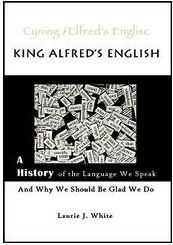Are you interested in history?
What about the development of language (English specifically)?
If so, I have a recommendation for you.
And even if you aren’t interested in history or the development of language, I think this book might just spark some interest.
The book is King Alfred’s English: A History of the Language We Speak and Why We Should Be Glad We Do by Laurie White.

I received a copy of King Alfred’s English to review. It is the Kindle version, so I was able to download it while I was on vacation. I read the introduction and knew immediately that it was going to be a good book. But I was on vacation, and when I got home I let various things keep me from getting back to the book until a couple of weeks ago. As my review deadline loomed, I knew I had to get reading.
However, I had no trouble at all finishing this book in time. (Getting the review written on the other hand is a different story!)
This is without a doubt, the most interesting history book that I can remember reading.
The author, Laurie White, has an engaging writing style. The book is easy to read, yet not simple. It is full of facts, but not dry or boring. She doesn’t use that annoying chatty writing style. (Obviously, some people like it, but I ironically find it annoying. Not in blogs of course, but in books.) But even though the book isn’t chatty, it does almost feel like listening to an interesting speaker.
King Alfred’s English recounts the history of the English language. It describes the major influences of the language, and as a result, it discusses much of the history of England. It is not an in-depth history of England, but I found it to be a marvelous survey. I tend to get a bit OCD about historical books and start trying to make sure we read them when we’re studying that time period in history. And I guess you could stretch this book out and read it along with your history lessons, but I think this book is best to just read. If you’re familiar with some of the history, then it’s a great review for those parts. If some of the history is new, then it’s a wonderful introduction for more in-depth study.
Since I’ve been teaching (or more accurately, facilitating the study of) Latin to my children, I found it especially interesting to learn that Old English was an inflected language like Latin. Inflected means that the function of the words in the sentence is determined by the word endings. In Modern English, word order determines the meaning. As time passes, languages tend to simplify, and English lost the inflection. Since Latin is a dead language, it didn’t simplify to the same point that English has.
To say that English has simplified might make it sound like it is easy. That is of course, not true. The vocabulary in English far exceeds that of other languages. King Alfred’s English explains why. It also covers the Reformation in England and how it led to an English translation of the Bible. In addition, there is an interesting section on how the King James Bible has affected English.
In case you can’t tell, I highly recommend this book. It is available from Christianbook.com and Amazon.com in both paperback and Kindle. You can also find more information about the book as well as teacher helps and student pages at the author’s website, The Shorter Word.
Disclosure: I received a copy of King Alfred’s English to review. I was not compensated for this review. All opinions expressed are my own. This post contains an affiliate link.

Thanks for your review. This is something I have always wanted to research. I’ll start with this book.
I just found your blog. I’m looking forward to reading through your old posts on Classical Education.
Pingback: The Old Schoolhouse and a brand new resource for homeschoolers | The Shorter Word